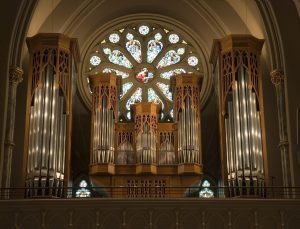Killing organists and future worship music
 I just came from a meeting where I was singularly the face of the contemporary praise and worship movement.
I just came from a meeting where I was singularly the face of the contemporary praise and worship movement.
As a group of music folks from the community, we were discussing the possibility of a new part-time organ teaching position in town. Several of the group are current or former organists, many having served regularly in churches. Some expressed a desire to see the position be more than part-time, but the reality is there are not enough organ students to require a full-time organ teacher.
One former church organist lamented this, saying that a nearby city only has one full-time church organ position where there used to be many. It’s all because of…
The committee chair looked at me, smiled, and said, “It’s all that praise and worship stuff!” Many in the group laughed, knowing this had come up before, how churches don’t pay organists anymore, they’re all going for “praise bands” and I am “in a praise band.” But I could sense there was a little hint of resentment.
Not so much toward me, perhaps. (Everyone loves me, of course!) But there seemed to be some sadness toward not feeling valued or having a place to have a gift honored.
Imagine spending years of study, hours upon hours of practice, week after week of service, sweat, passion, all poured into expressing something from deep within you, and then to be told “we’re going in a different direction.”
This combined with the push from up-and-comers could understandably lead to hard feelings.
Perhaps we’ve tried too hard to legitimize newer forms of worship with an intent to correct a perception that ours is lower than theirs. But instead of bringing ours up to the level of theirs, we’ve brought theirs down, a lose-lose proposition.
The future of worship
The same organist in the meeting predicted that children being born now are going to love organ music, based on the fact that style is cyclical. I’m not sure there’s a basis for that statement as it relates specifically to organ, but we can certainly observe that worship forms are indeed always changing.
The modern praise and worship movement is not diminishing. But I believe many younger Christians are finding value in traditional worship music and liturgy forms.
The lesson I see here is not one of balance. The answer is not that we need to strike an optimum mix between modern and traditional, or any other this and that.
I believe the reason why worship forms circle around again is that eventually, the emptiness of the form itself is exposed. Forms of worship are just that: forms, not worship itself. Music, either traditional or modern, sung or played (or rapped!), cannot constitute worship. When people see the limitations of a form, they often seek the answer in a different form.
What’s really worship obviously lies deeper. It’s the heart of Christ, expressed in living and breathing people, in community. Community that loves. Community that honors others. Community that finds a place for others.
So I don’t know if the future of worship music will be organs or guitars or software applications or some instrument yet to be invented. I do know the future of worship will involve people with hearts open toward God and each other.

